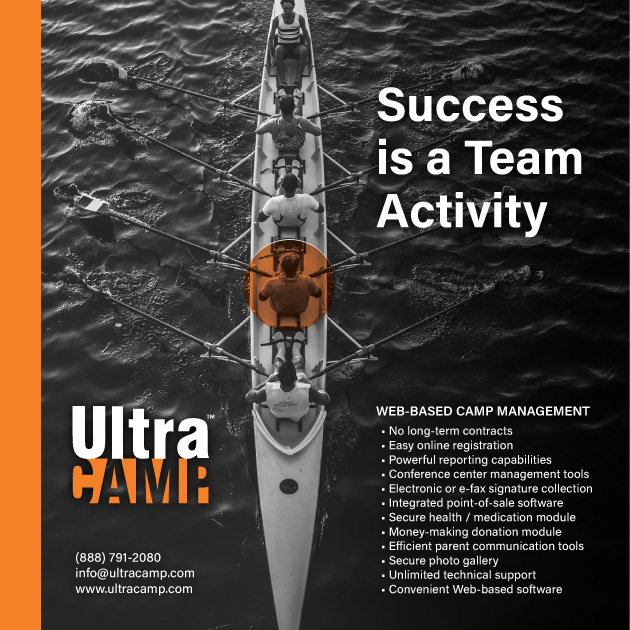As former camp directors, we've both had experiences where we pushed ourselves to the point where we weren't safe. Imagine this scenario:
It is the last day of camp. As a program director, you must make sure you finish the last round of activities without anyone getting hurt. Then you must make sure your campers get packed up, and that transportation is organized. You stay up all night long because the first bus is packed at 3:00 a.m., then at 5:30 you have to drive another bus two hours to get some campers to the airport. You haven't slept, sat down, or eaten properly in at least 24 hours. Sometimes you haven't even had time to go to the bathroom. Now you're driving a bus full of kids.
Sound familiar? While to outsiders that might sound exaggerated or extreme, we suspect it's familiar to many camp professionals. This scenario — or ones like it — happens at high-functioning, well-organized camps all the time. And note that while this example talks about a program director who is being pushed to the brink of exhaustion, counselors and staff are just as vulnerable to overdoing it.
Increasingly, camps are realizing that we need to rethink some aspects of our culture. And we are by no means alone.
In recent years, the restaurant industry — famous for its macho culture and high-pressure lifestyle — has become extremely conscious of the need for self-care. From organizing workshops on sobriety to how to manage stress, restauranteurs have realized that having their top talent burn the candle at both ends is a self-destructive and self-defeating mode of operation.
The military is recognizing similar issues. Whether it's support for marriage counseling or better food in mess halls, there is recognition that no soldiers can perform at their best if they are not able to take care of their needs as a whole human being.
Camp is no different. It is often in a high-pressure environment where you are asked to make decisions that can affect a child's life, where sleep is sometimes minimal, and where alone time is scarce to nonexistent. Of course, camp is for the campers, but that doesn't mean you should neglect taking care of yourselves. In fact, role-modeling self-care for your peers and for the campers is the first step to being the best possible counselor — and being the best possible counselor is essential for keeping campers safe.
In our work now, we regularly review the claims we receive to see if we can identify patterns or opportunities for improving safety. On reviewing our claims from the most recent summer, we noticed that both the severity and frequency of claims were disproportionately occurring toward the end of the season, or in situations where camp staff and counselors were tired, burned-out, and no longer able to focus on the trainings they received back when they were fresh, enthusiastic, and raring to go.
Obviously, camp leadership and management have an important role to play in creating cultures where self-care is not just permitted, but actively encouraged. However, you can contribute to both modeling that culture and advocating for it within the camp environment. Following are some suggestions for places to start.
Eat Regularly, Eat Well, and Drink Lots of Water
Nobody can function at their best if their body isn't fueled. And yet the chaos of the dining hall often means you spend more time controlling behavior or making sure everyone else is fed, that you don't really get a chance to look after your own needs. Take the following steps to make sure your body is getting the sustenance it needs:
- Select healthy foods, not just junk foods. That includes fruit, vegetables, and a good source of protein.
- Snacking doesn't have to mean a candy bar. Having fruit, proteins, or other on-the-go options available can help keep your energy up when time is short.
- Drink water, and lots of it. Whether you take a water break along with campers or set a routine to drink a full glass of water with every meal, staying hydrated protects you — and it models safe behavior for campers too.
- Save the cheers for later. Yes, you need to make sure that little Jimmy is eating his greens and Kim and Kayla aren't fighting again, but you also need to make sure that you get time to eat properly and recharge. If that means saving the cheers or songs until after everyone has had the opportunity to eat, so be it. You can't cheer well on an empty stomach anyway.
Get Some Sleep by Any Means Necessary
Of all the things our body needs to be healthy, sleep may be the most challenging in a camp environment — especially for staff and counselors who are expected to supervise cabins when campers are asleep. The following suggestions may help to mitigate that problem:
- Use your down time wisely. Be aware of how much sleep you get at home, and find ways to make up for lost sleep when you can. If that means going to bed when campers do, then go ahead and do that. It may actually be necessary to get more sleep at caamp; it's busy and hot and your body heals and recharges when you are sleeping.
- Shape your environment. If you can't get sleep in the cabin environment, talk to camp leadership about finding alternative spaces for staff to nap.
- Watch the stimulants. Yes, coffee is key to surviving camp for many of us. But be aware of how coffee or other stimulants may be impacting your sleep patterns. Consider going without if you need to.
Fear the FOMO
Camp is exciting, and there is always something going on. But you can't do it all. Be sure to pay attention to your own impulses if you are concerned about missing out on a beach trip or a late-night movie. Use your time off wisely. Refill your energy bucket during time off so you can be the best for your campers when you return.
Emotional and Spiritual Well-Being Matters Too
All of us need to recharge not just our bodies, but our minds and hearts too — whether that is through prayer, meditation, simple reflection, working out, running, or a quiet walk in the woods. Regardless of faith or cultural traditions, each of us can benefit from time out for nurturing our inner well-being. Here are some ideas for doing that:
- Reflect on what you need back home and then replicate. If you regularly attend church, temple, mosque, or synagogue; if you talk to your mom daily; or if you practice yoga regularly; find ways to replicate that experience within the camp space. You might need to get creative, talking for longer once a week, or holding an informal prayer session or meditation group with friends.
- Build a support network, and don't be afraid to reach out. Being away from camp means being away from your usual network of friends, family, and mentors. Look to build a supportive group of friends — and try to be that friend for others. Don't be afraid to reach out to leadership if you are feeling lonely.
- Keep an eye on mental health. A growing number of camps are offering Mental Health First Aid training to spot campers, counselors, or other staff who may be in distress. Take these trainings if available, and keep a close eye both on your own mental well-being and on those around you. Be sure to reach out if you feel like somebody is struggling.
Take Care of the Basics
Some of us are more open about the intimate workings of our bodies than others. Yet making sure that you are taking care of your body means paying attention to those details. This includes:
- Regular bathroom habits. You're in a strange environment with less privacy than you might be used to. Make sure you're going to the bathroom regularly — and if you're not, be sure to eat fiber and/or talk to leadership about finding more privacy to do what you need to do.
- Hygiene matters. There are plenty of jokes about how bad we all smell once camp is over, but we don't need to go to extremes. Washing hands, bathing regularly, and generally taking care of your body will help you feel refreshed and keep illnesses at bay. Your fellow staff and counselors will appreciate it too.
- Ask for what you need. Whether it's feminine hygiene products, deodorant, or a fresh toothbrush, if you need supplies to help look after your body, do not be embarrassed to ask. (You will not be the only one.)
- Keep up with medication. If you take any medications or vitamins, be sure to keep up with that routine as recommended by your physician. If you have the opportunity for a pre-camp physical, or to check in with your camp's health care provider, that's a great time to check in with the doc about the physical, mental, and emotional stresses of being a busy camp counselor.
Elite athletes achieve incredible things. And they go through an awful lot of pain and challenges to do so. But they are only able to do so because they are careful about how they treat their bodies and their minds.
At some point this summer, you will hit a moment when you are tired, hungry, dehydrated, or all three. Your ability to make decisions for yourself will be challenged, not to mention your ability to make decisions for the campers in your care. The reality of camp is that it is a 24/7 endeavor. It takes a lot of time and energy to make it all work. Food, water, and rest — those are the basics. And they are central to being able to deliver on everything else. This is a marathon, not a sprint. So be sure to fuel up accordingly so that you are performing at your best. That way, you will be able to provide campers with the positive, safe experience they deserve.
Checklist for Self-Care
Following is a set of suggestions for getting the most out of your camp experience while looking after yourself and others. Consider printing this as a reminder and hanging it in your locker or cubby:
- Get eight hours of sleep.
- Shower daily (the lake/pool doesn't count).
- Wash your hands before eating and after using the restroom.
- Take 10: Find 10 minutes a day to pray/meditate/read/run — whatever activity feeds your soul.
- Consider journaling or making notes about your day.
- Say something kind to at least three people.
- Reach out to different people and make new connections each day.
- Drink at least 64 ounces of water (more if possible, especially in hot climates and when on active assignments).
- Wear sunscreen.
- Take care of your feet! Wear the right shoes for the activity.
- Take your meds/vitamins.
- Eat three well-balanced meals a day.
- Choose healthy snacks.
- Return from your time off rested.
Meredith Stewart and Katie Johnson both serve as risk consultants for The Redwoods Group, a mission-driven social enterprise that uses insurance to prevent harm. Prior to joining The Redwoods Group, Meredith Stewart was involved with YMCA Camp Seafarer and YMCA Camp Kanata, both in North Carolina. Meredith can be reached at [email protected].
Before joining Redwoods, Katie served on the American Camp Association staff for eight years and was a camp director for Camp Fire Camps on the West Coast prior to that time. She can be reached via email at [email protected].




